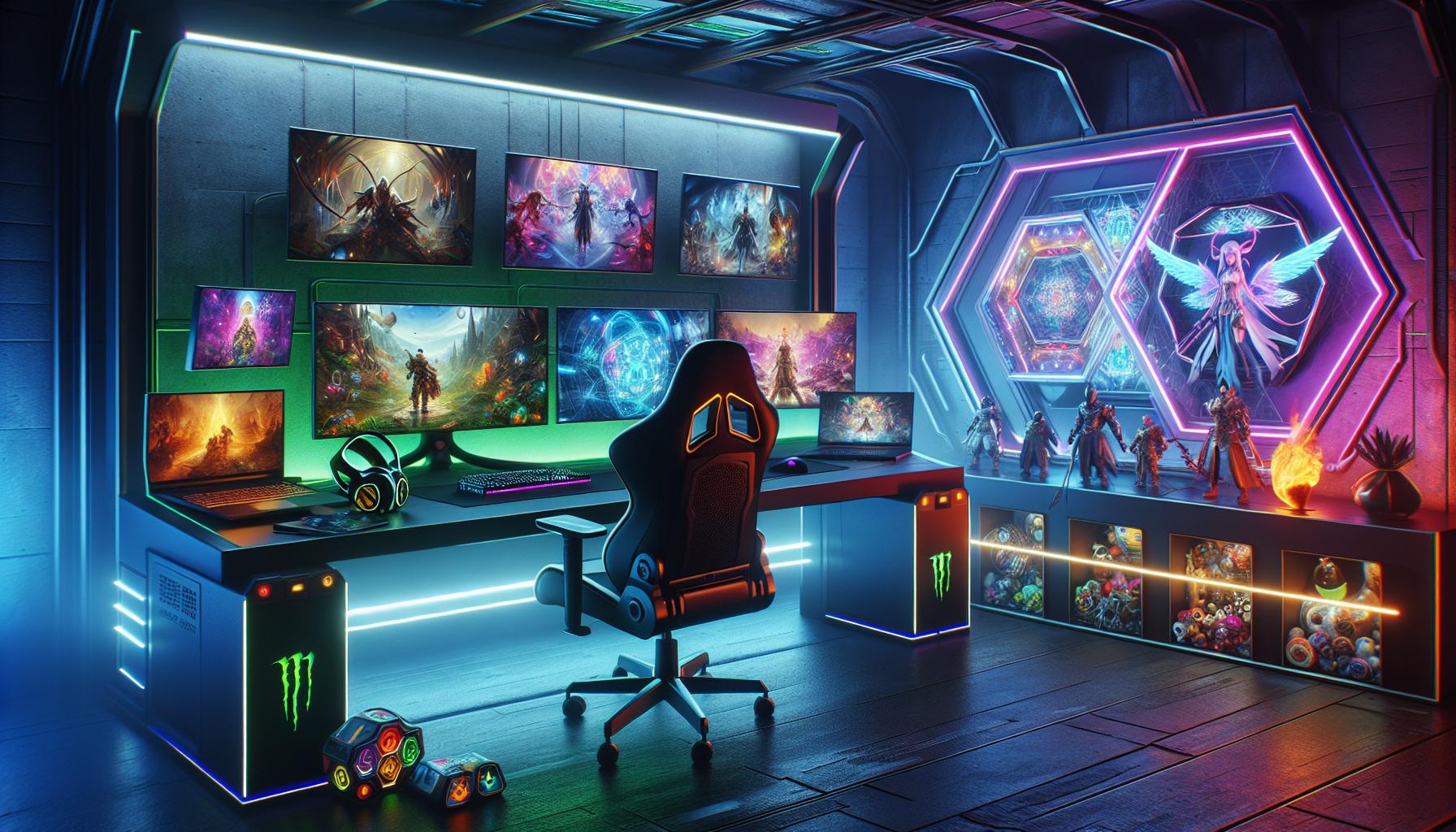Phone:
(701)814-6992
Physical address:
6296 Donnelly Plaza
Ratkeville, Bahamas.

The world of gaming just leveled up with the latest crypto innovations. Imagine earning real digital assets while conquering virtual realms—sounds like a gamer’s dream, right?
Crypto gaming is no longer a niche; it’s booming with new titles, groundbreaking technologies, and thrilling news that keeps enthusiasts on their toes. Whether you’re a seasoned gamer or a crypto newbie, staying updated on these trends is crucial to navigating this dynamic landscape.
Dive into the freshest crypto gaming news and discover how blockchain is reshaping your favorite pastimes. From play-to-earn models to decentralized gaming ecosystems, there’s never been a more exciting time to join the revolution.
Crypto gaming integrates blockchain technology with video games, enabling players to earn, trade, and own digital assets. This fusion transforms traditional gaming by introducing decentralized economies and true ownership of in-game items. In 2023, the crypto gaming market reached an estimated value of $2.5 billion, showcasing significant growth from previous years. Play-to-earn models drive this expansion, allowing gamers to monetize their gameplay through cryptocurrency rewards and non-fungible tokens (NFTs).
Developers prioritize creating interoperable platforms where assets can move seamlessly between different games. Decentralized Autonomous Organizations (DAOs) manage these ecosystems, ensuring transparent governance and community-driven decisions. Additionally, partnerships between blockchain companies and established game studios accelerate the adoption of crypto gaming. For instance, collaborations with firms like Enjin and Polygon enhance scalability and user experience.
Security remains a top concern; thus, robust smart contracts and secure wallets protect players’ assets. Innovative tokenomics incentivize participation and retention, offering staking and yield farming opportunities within gaming environments. Furthermore, virtual reality (VR) and augmented reality (AR) integrations provide immersive experiences, bridging the gap between digital and physical interactions.
A diverse range of genres caters to various player preferences, from role-playing games (RPGs) to strategy and sports titles. Esports also benefits from crypto integration, with blockchain facilitating transparent prize distributions and sponsorships. Statistics indicate that over 60% of gamers are interested in crypto-based rewards, highlighting the demand for such features.
Regulatory developments influence the landscape, as governments establish frameworks to govern digital currencies and virtual assets. Compliance with these regulations ensures the sustainability and legitimacy of crypto gaming platforms. As technology evolves, advancements in scalability and interoperability will further propel the industry, making crypto gaming a pivotal component of the broader gaming ecosystem.
| Year | Market Value ($ Billion) |
|---|---|
| 2020 | 0.5 |
| 2021 | 1.2 |
| 2022 | 1.8 |
| 2023 | 2.5 |

Crypto gaming advances rapidly, introducing innovative features and strategic alliances. These developments shape the future of the industry.
2024 sees the launch of five major crypto games, expanding the market beyond $2.5 billion. Titles such as CryptoQuest, BlockWarriors, and NFT Legends introduce enhanced play-to-earn mechanics. Each game integrates blockchain technology, enabling players to earn and trade NFTs and cryptocurrencies seamlessly. Developers prioritize interoperability, allowing assets to move freely between different gaming platforms. Additionally, genres diversify, with new releases in strategy, RPG, and first-person shooters. Enhanced graphics and virtual reality support improve user engagement, while secure smart contracts ensure asset protection. These releases drive user acquisition and retention, reinforcing crypto gaming’s position in the broader gaming ecosystem.
In 2024, ten key partnerships strengthen the crypto gaming landscape. Major blockchain firms collaborate with established game studios to enhance scalability and security. For example, BlockchainX partners with GameStudioA to integrate advanced smart contracts, ensuring transparent asset management. Collaborations also occur between crypto exchanges and gaming platforms, facilitating seamless cryptocurrency transactions for players. Additionally, alliances with virtual reality companies improve immersive experiences, attracting a broader audience. These strategic moves foster innovation, streamline user experiences, and expand the market reach. As partnerships grow, the crypto gaming sector benefits from shared expertise and resources, driving sustained industry growth.
Leading the crypto gaming revolution involves both innovative platforms and dominant market leaders shaping the industry’s future.
Blockchain platforms drive crypto gaming advancements by integrating cutting-edge technologies. Ethereum remains pivotal, supporting numerous decentralized games with its robust smart contracts. Binance Smart Chain enhances scalability, reducing transaction fees for players. Solana offers high-speed transactions, essential for seamless gaming experiences. Interoperability is prioritized by platforms like Enjin, enabling asset movement across different games. Additionally, Immutable X focuses on eco-friendly NFT solutions, addressing sustainability concerns. Decentralized Autonomous Organizations manage these platforms, ensuring transparent governance and community-driven development. Virtual reality integration by platforms such as Decentraland creates immersive environments where players can interact and trade digital assets securely. These innovations collectively enhance user experience, drive adoption, and maintain the momentum of the crypto gaming sector.
Several key players dominate the crypto gaming landscape, each contributing uniquely to the industry’s growth. Axie Infinity leads with its successful play-to-earn model, attracting millions of active users. Ubisoft has entered the space through strategic partnerships, bringing mainstream gaming expertise to blockchain projects. Animoca Brands invests heavily in NFT-based games, fostering a diverse portfolio of titles. Sky Mavis, the developer behind Axie Infinity, continues to innovate with new features and expansions. Decentraland stands out in virtual reality gaming, offering expansive virtual worlds for players to explore and monetize. Additionally, The Sandbox excels in user-generated content, allowing players to create and sell their own in-game assets. These leaders leverage their strengths to drive adoption, enhance gameplay mechanics, and expand the reach of crypto gaming globally.
The crypto gaming industry continues to evolve, driven by several key trends shaping its future. Major game launches in 2024 are set to expand the market beyond the $2.5 billion valuation observed in 2023. Titles such as CryptoQuest, BlockWarriors, and NFT Legends introduce advanced play-to-earn mechanics, enabling players to earn cryptocurrency and NFTs through gameplay. These games prioritize interoperability, allowing seamless asset transfers across different platforms and enhancing the overall user experience.
Diversification of game genres is another significant trend, with the introduction of strategy, role-playing, and first-person shooter games. This expansion caters to varied player preferences and broadens the appeal of crypto gaming. Improved graphics and virtual reality support further enhance immersion, attracting a wider audience and increasing engagement.
Strategic partnerships play a crucial role in strengthening the crypto gaming landscape. In 2024, ten key alliances are expected to bolster scalability and security within the industry. Collaborations between blockchain firms and established game studios ensure robust infrastructure and secure transactions. Additionally, partnerships with crypto exchanges and gaming platforms facilitate smooth cryptocurrency transactions for players, promoting a more integrated gaming ecosystem.
The focus on scalability and security remains paramount as the industry grows. Enhanced smart contracts and secure wallets protect players’ digital assets, addressing ongoing security concerns. Moreover, the integration of Decentralized Autonomous Organizations (DAOs) ensures transparent governance, allowing communities to participate in decision-making processes.
| Game Title | Genre | Key Features |
|---|---|---|
| CryptoQuest | Role-Playing Game | Advanced play-to-earn mechanics |
| BlockWarriors | Strategy | Interoperable asset management |
| NFT Legends | First-Person Shooter | Enhanced VR support and graphics |
| MetaBuilders | Sandbox | Cross-platform asset integration |
| DeFiConquest | Strategy RPG | Gamified DeFi mechanisms |
These emerging trends demonstrate the crypto gaming industry’s commitment to innovation, user engagement, and secure, scalable growth. As the sector advances, these developments are expected to solidify crypto gaming’s position within the broader gaming ecosystem.
Regulatory uncertainty remains a significant hurdle for the crypto gaming industry. Diverse regulations across countries create compliance challenges for developers and platforms, potentially slowing expansion efforts. Security concerns persist despite advancements in smart contract technology. Ensuring robust protection for players’ digital assets requires continuous improvements to prevent hacks and vulnerabilities.
Scalability issues affect the seamless user experience essential for growth. Blockchain networks must handle increasing transaction volumes as the market expands beyond the current $2.5 billion valuation. Limited scalability can result in slower transaction times and higher fees, discouraging user participation. Interoperability between different gaming platforms also presents a challenge. Achieving seamless asset movement across various games and ecosystems requires standardized protocols and collaborative efforts among developers.
User adoption poses another obstacle. Traditional gamers may be hesitant to embrace crypto gaming due to the complexity of blockchain technology and the volatility of cryptocurrencies. Educating the gaming community and simplifying the onboarding process are crucial for broader acceptance. Additionally, the volatility of cryptocurrency markets can impact in-game economies. Fluctuating asset values may affect the stability of play-to-earn models, making it difficult to maintain consistent rewards for players.
Integration complexity between blockchain technology and existing gaming infrastructures further complicates development. Combining decentralized systems with established game mechanics demands specialized expertise and can increase project timelines. Environmental concerns associated with certain blockchain operations also attract scrutiny. The industry’s commitment to eco-friendly solutions is vital to address sustainability issues and meet the expectations of environmentally conscious gamers.
Lastly, maintaining a balance between innovation and user experience is essential. While introducing advanced features like virtual reality and enhanced graphics attracts users, it must not compromise the accessibility and performance of games. Overcoming these challenges is critical for the sustained growth and mainstream acceptance of crypto gaming, ensuring it remains a pivotal component of the broader gaming ecosystem.
The crypto gaming industry is projected to surpass $5 billion by 2025, driven by continuous advancements in blockchain technology. Scalability improvements, such as Ethereum’s transition to proof-of-stake, enhance transaction speeds and reduce costs, facilitating a smoother gaming experience. Interoperability standards are set to become more widespread, enabling seamless asset transfers across diverse gaming platforms.
Emerging game genres will diversify the market, with strategy, role-playing, and first-person shooters gaining traction. Enhanced graphics and virtual reality integration will attract a broader audience, increasing user engagement and retention rates. Additionally, decentralized finance (DeFi) integration within games will offer players more financial incentives and investment opportunities.
Regulatory frameworks are expected to evolve, providing clearer guidelines for developers and investors. This regulatory clarity will foster greater trust and encourage institutional investment in crypto gaming projects. Security measures will also advance, incorporating more robust smart contracts and multi-factor authentication to protect digital assets and user data.
Strategic partnerships between blockchain firms and established game studios will continue to accelerate industry growth. Collaborations with major cryptocurrency exchanges will streamline in-game transactions, enhancing user convenience and expanding market reach. Furthermore, the rise of Decentralized Autonomous Organizations (DAOs) will promote community-driven governance, ensuring transparent and equitable decision-making processes.
Sustainability initiatives will become a priority, with blockchain platforms adopting eco-friendly practices to reduce their environmental impact. Green NFTs and energy-efficient consensus mechanisms will address growing environmental concerns, aligning the industry with global sustainability goals.
| Projection | Estimated Value by 2025 |
|---|---|
| Market Size | $5 billion |
| Number of Major Game Launches | 10 |
| Strategic Partnerships | 20 |
| User Base Growth | 150% increase |
Technological innovations, regulatory developments, and strategic collaborations will collectively shape the future of crypto gaming. These factors will drive the industry’s expansion, making crypto gaming an integral component of the global gaming landscape.
Crypto gaming continues to reshape the landscape by merging immersive gameplay with blockchain technology. As the industry evolves it presents gamers with unique opportunities to earn and own digital assets. Ongoing advancements in scalability and interoperability are key drivers of growth. Strategic partnerships between blockchain firms and game developers enhance both security and user experience. Emerging technologies like VR and AR are integrating into games making the future of crypto gaming promising. Navigating regulatory challenges and ensuring robust security will be crucial for sustained success. Gamers and developers alike are poised to benefit from this dynamic and innovative sector as it becomes a staple in the broader gaming ecosystem.